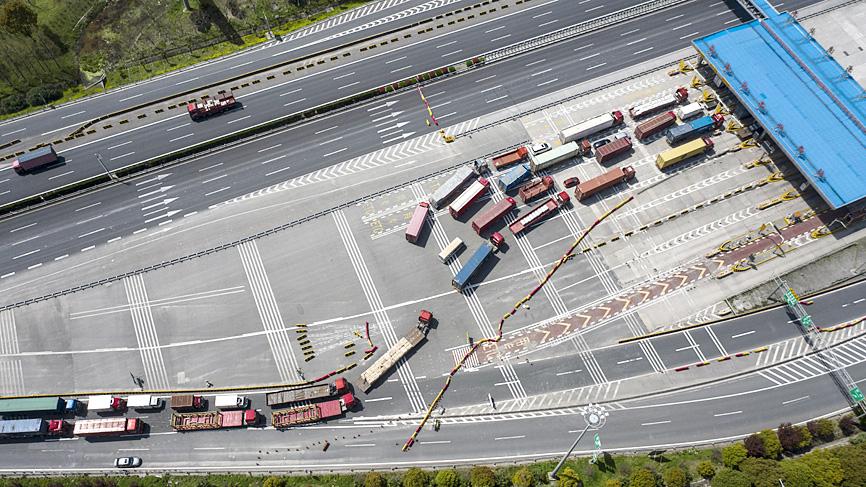
“FACING THE CHALLENGES”:
A German business delegation said businesses could be forced to close as the supply of raw materials has been compromised due to logistical problems.
Even companies in China whose factories operate under so-called closed-loop systems could be forced to stop work due to parts shortages or logistical problems that make it nearly impossible to move people and goods across the country. said a European chamber of commerce.
“A few companies are currently operating in closed-loop production. These companies are facing challenges and could close very soon due to lack of logistics and workers,” Maximilian Butek, chief representative of the Delegation of German Industry and Trade in Shanghai, said in a LinkedIn post on Monday. .
“Their workers for closed-loop production have been working for over three weeks and need to be replaced,” Butek said.
Photo: Bloomberg
Butek added that most members of his association cannot “operate production sites because they cannot have raw materials delivered to them and cannot deliver their products to their customers. Logistics in Shanghai does not work.
Officials in China’s financial hub have encouraged companies to restart production that has been halted due to the city’s strict COVID-19 bans using closed-loop systems in which workers live on-site in their factories.
While some, like Tesla Inc and Quanta Computer Inc (廣達電腦), which make laptops for Apple Inc, have restarted operations, the experience has not been smooth.
Tesla only has inventory for just over two weeks based on its new closed-loop schedule, a person familiar with the matter said, while workers locked in Volkswagen AG’s Shanghai factory do not have an adequate supply of auto parts needed to manufacture vehicles.
Meanwhile, cargo deliveries at Shanghai Pudong International Airport are increasingly disrupted, said Taipei-based air and sea freight forwarder and logistics specialist Dimerco Express Corp (中菲行).
Before the city’s lockdown, around 1,000 shipments could arrive per day and around 80% would be picked up by truck, said Kathy Liu (劉辰), Dimerco’s director of global sales and marketing.
However, because there are not enough trucks to pick up the goods, that pick-up rate has dropped to just 10%, she said.
“There are more and more shipments piling up at the freight forwarders’ warehouse or bonded warehouse,” Liu said. “So that’s caused a lot of problems, because we don’t have enough space to store all these pending shipments, but they keep coming.”
The problem remains inter-provincial road transport and the various restrictions and health requirements imposed locally, forcing truckers to manage a range of policies.
Truckers wanting to travel between Shanghai and northern Jiangsu province typically had to wait two to three hours each time to take COVID-19 tests, Dimerco said.
Earlier this month, Beijing demanded that highways remain open and unobstructed.
China’s Ministry of Transportation has ordered no COVID-19 test checkpoints to be set up so that traffic on main highway lanes remains smooth.
Other logistical issues still exist, causing delays, Dimerco said.
“A lot of truckers see the potential risk, so they’re not willing to take orders for these routes,” Liu said. “It’s a very difficult time, not only for us, but also for those like couriers or online e-commerce businesses.”
Dimerco has only managed to keep its Shanghai warehouse open by allowing staff to sleep in the facility since March 28.
Supply and logistics problems are not limited to Shanghai.
Butek said delegation businesses in the Yangtze River Delta found that logistics weren’t working there either, “since different cities have different rules.”
“For technical personnel, who have to run quality assessments or machine maintenance in other parts of China, it’s almost impossible to commute or travel,” he said.
“Customers may turn to other sources in China if the situation does not change soon,” he added.
Comments will be moderated. Keep comments relevant to the article. Remarks containing abusive and obscene language, personal attacks of any kind or promotion will be removed and the user banned. The final decision will be at the discretion of the Taipei Times.